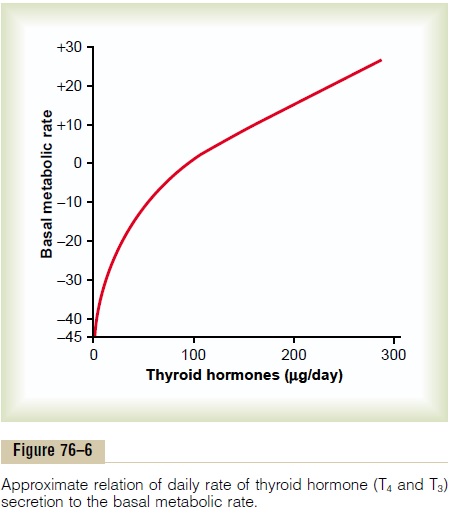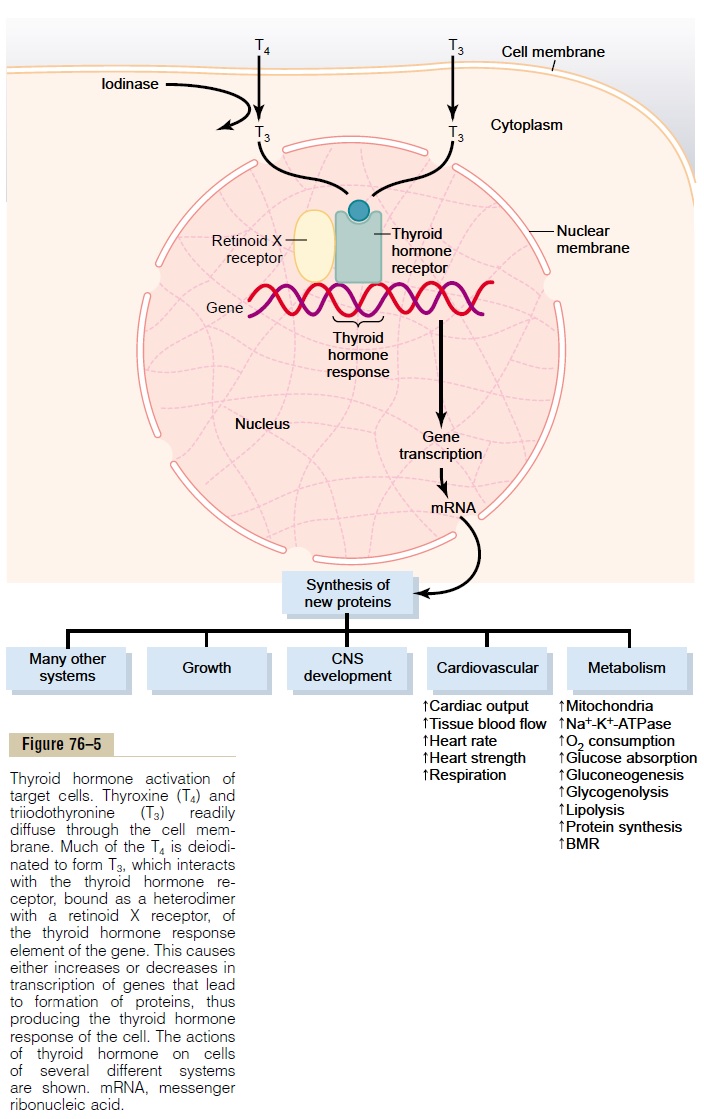Chapter: Medical Physiology: Thyroid Metabolic Hormones
Effects of Thyroid Hormone on Specific Bodily Mechanisms
Effects of Thyroid Hormone on Specific Bodily Mechanisms
Stimulation of Carbohydrate Metabolism. Thyroid hormonestimulates almost all aspects of carbohydrate metabolism, including rapid uptake of glucose by the cells, enhanced glycolysis, enhanced gluconeogenesis, increased rate of absorption from the gastrointestinal tract, and even increased insulin secretion with its resultant secondary effects on carbohydrate metabolism. All these effects probably result from the overall increase in cellular metabolic enzymes caused by thyroid hormone.
Stimulation of Fat Metabolism. Essentially all aspects offat metabolism are also enhanced under the influence of thyroid hormone. In particular, lipids are mobilized rapidly from the fat tissue, which decreases the fat stores of the body to a greater extent than almost any other tissue element. This also increases the free fatty acid concentration in the plasma and greatly acceler-ates the oxidation of free fatty acids by the cells.
Effect on Plasma and Liver Fats. Increasedthyroidhormone decreases the concentrations of cholesterol, phospholipids, and triglycerides in the plasma, even though it increases the free fatty acids. Conversely, decreased thyroid secretion greatly increases theplasma concentrations of cholesterol, phospholipids, and triglycerides and almost always causes excessive deposition of fat in the liver as well. The large increase in circulating plasma cholesterol in prolonged hypothyroidism is often associated with severe ather-osclerosis.
One of the mechanisms by which thyroid hormone decreases the plasma cholesterol concentration is to increase significantly the rate of cholesterol secretion in the bile and consequent loss in the feces. A possible mechanism for the increased cholesterol secretion is that thyroid hormone induces increased numbers of low-density lipoprotein receptors on the liver cells, leading to rapid removal of low-density lipoproteins from the plasma by the liver and subsequent secretion of cholesterol in these lipoproteins by the liver cells.
Increased Requirement for Vitamins. Because thyroidhormone increases the quantities of many bodily enzymes and because vitamins are essential parts of some of the enzymes or coenzymes, thyroid hormone causes increased need for vitamins. Therefore, a rela-tive vitamin deficiency can occur when excess thyroid hormone is secreted, unless at the same time increased quantities of vitamins are made available.
Increased Basal Metabolic Rate. Because thyroidhormone increases metabolism in almost all cells of the body, excessive quantities of the hormone can occasionally increase the basal metabolic rate 60 to 100 per cent above normal. Conversely, when no thyroid hormone is produced, the basal metabolic rate falls almost to one-half normal. Figure 76–6 shows the approximate relation between the daily supply of thyroid hormones and the basal metabolic rate. Extreme amounts of the hormones are required to cause very high basal metabolic rates.

Decreased Body Weight. Greatly increased thyroidhormone almost always decreases the body weight, and greatly decreased hormone almost always increases the body weight; these effects do not always occur, because thyroid hormone also increases the appetite, and this may counterbalance the change in the metabolic rate.

Effect of Thyroid Hormones on the Cardiovascular System Increased Blood Flow and Cardiac Output. Increasedmetabolism in the tissues causes more rapid utilization of oxygen than normal and release of greater than normal quantities of metabolic end products from the tissues. These effects cause vasodilation in most body tissues, thus increasing blood flow. The rate of blood flow in the skin especially increases because of the increased need for heat elimination from the body. As a consequence of the increased blood flow, cardiac output also increases, sometimes rising to 60 per cent or more above normal when excessive thyroid hormone is present and falling to only 50 per cent of normal in very severe hypothyroidism.
Increased Heart Rate. The heart rate increases con-siderably more under the influence of thyroid hormone than would be expected from the increase in cardiac output. Therefore, thyroid hormone seems to have a direct effect on the excitability of the heart, which in turn increases the heart rate. This effect is of particular importance because the heart rate is one of the sensitive physical signs that the clinician uses in determining whether a patient has excessive or dimin-ished thyroid hormone production.
Increased Heart Strength. The increased enzymaticactivity caused by increased thyroid hormone produc-tion apparently increases the strength of the heart when only a slight excess of thyroid hormone is secreted. This is analogous to the increase in heart strength that occurs in mild fevers and during exercise. However, when thyroid hormone is increased markedly, the heart muscle strength becomes depressed because of long-term excessive protein catabolism. Indeed, some severely thyrotoxic patients die of cardiac decompensation secondary to myocar-dial failure and to increased cardiac load imposed by the increase in cardiac output.
Normal Arterial Pressure. Themeanarterial pressureusually remains about normal after administration of thyroid hormone. Because of increased blood flow through the tissues between heartbeats, the pulse pres-sure is often increased, with the systolic pressure ele-vated in hyperthyroidism 10 to 15 mm Hg and the diastolic pressure reduced a corresponding amount.
Increased Respiration. The increased rate of metabolismincreases the utilization of oxygen and formation of carbon dioxide; these effects activate all the mecha-nisms that increase the rate and depth of respiration.
Increased Gastrointestinal Motility. In addition toincreased appetite and food intake, which has been discussed, thyroid hormone increases both the rates of secretion of the digestive juices and the motility of the gastrointestinal tract. Hyperthyroidism often results in diarrhea. Lack of thyroid hormone can cause consti-pation.
Excitatory Effects on the Central Nervous System. In general,thyroid hormone increases the rapidity of cerebration but also often dissociates this; conversely, lack of thyroid hormone decreases this function. The hyper-thyroid individual is likely to have extreme nervous-ness and many psychoneurotic tendencies, such as anxiety complexes, extreme worry, and paranoia.
Effect on the Function of the Muscles. Slight increase inthyroid hormone usually makes the muscles react with vigor, but when the quantity of hormone becomes excessive, the muscles become weakened because of excess protein catabolism. Conversely, lack of thyroid hormone causes the muscles to become sluggish, and they relax slowly after a contraction.
Muscle Tremor. One of the most characteristic signs ofhyperthyroidism is a fine muscle tremor. This is not the coarse tremor that occurs in Parkinson’s disease or in shivering, because it occurs at the rapid frequency of 10 to 15 times per second. The tremor can be observed easily by placing a sheet of paper on the extended fingers and noting the degree of vibration of the paper. This tremor is believed to be caused by increased reac-tivity of the neuronal synapses in the areas of the spinal cord that control muscle tone. The tremor is an important means for assessing the degree of thyroid hormone effect on the central nervous system.
Effect on Sleep. Because of the exhausting effect ofthyroid hormone on the musculature and on the central nervous system, the hyperthyroid subject often has a feeling of constant tiredness, but because of the excitable effects of thyroid hormone on the synapses, it is difficult to sleep. Conversely, extreme somnolence is characteristic of hypothyroidism, with sleep some-times lasting 12 to 14 hours a day.
Effect on Other Endocrine Glands. Increased thyroidhormone increases the rates of secretion of most other endocrine glands, but it also increases the need of the tissues for the hormones. For instance, increased thy-roxine secretion increases the rate of glucose metabo-lism everywhere in the body and therefore causes a corresponding need for increased insulin secretion by the pancreas. Also, thyroid hormone increases many metabolic activities related to bone formation and, as a consequence, increases the need for parathyroid hormone. Thyroid hormone also increases the rate at which adrenal glucocorticoids are inactivated by the liver. This leads to feedback increase in adrenocorti-cotropic hormone production by the anterior pituitary and, therefore, increased rate of glucocorticoid secre-tion by the adrenal glands.
Effect of Thyroid Hormone on Sexual Function. For normalsexual function, thyroid secretion needs to be approximately normal. In men, lack of thyroid hormone is likely to cause loss of libido; great excesses of the hormone, however, sometimes cause impotence.
In women, lack of thyroid hormone often causes menorrhagia and polymenorrhea— that is, respec-tively, excessive and frequent menstrual bleeding. Yet, strangely enough, in other women thyroid lack may cause irregular periods and occasionally evenamenorrhea.
A hypothyroid woman, like a man, is likely to have greatly decreased libido.To make the picture still more confusing, in the hyperthyroid woman, oligomenor-rhea, which means greatly reduced bleeding, iscommon, and occasionally amenorrhea results.
The action of thyroid hormone on the gonads cannot be pinpointed to a specific function but prob-ably results from a combination of direct metabolic effects on the gonads as well as excitatory and inhibitory feedback effects operating through the anterior pituitary hormones that control the sexual functions.
Related Topics